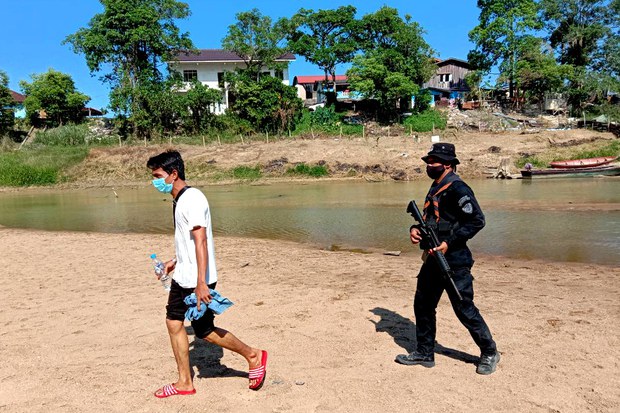Thailand Re-opens Border Checkpoints with Malaysia
2020.04.20
Narathiwat and Pattani, Thailand
 A soldier escorts a Thai worker who has just crossed Su-ngai Kolok River from Malaysia to Buereng Village in Narathiwat for immigration and COVID screening processing, April 20, 2020.
A soldier escorts a Thai worker who has just crossed Su-ngai Kolok River from Malaysia to Buereng Village in Narathiwat for immigration and COVID screening processing, April 20, 2020.
Thailand has re-opened five crossing points along its border with Malaysia to start gradually allowing the return of up to 4,000 Thai workers stranded in the neighboring country as part of a lockdown over the coronavirus pandemic, officials said Monday.
Kuala Lumpur extended its nationwide lockdown until April 28 but agreed to re-open checkpoints along its frontier with Thailand. On April 10, Bangkok announced that, starting April 18, it would reopen five border gates to allow up to 350 stranded Thais to return home every day.
Since Saturday, about 600 Thais have returned home through the checkpoints, while more than 700 others crossed over using various illegal entry points, officials said.
“Today, we had 106 Thai returnees who signed up with the Thai embassy in Kuala Lumpur,” Police Lt. Weerawat Nilawat, a deputy chief of Sadao district immigration office in Thailand’s Songkhla province, told BenarNews.
He said six of the Thai workers had been placed under quarantine after they registered high body temperatures.
Weerawat said 297 Thais were able to go back to their hometowns by crossing through his immigration district and around a similar number had returned through four other border gates.
In mid-March, Kuala Lumpur imposed travel curbs and declared a partial lockdown as it closed its nine official checkpoints with Thailand, in a move that affected thousands of Thais working in eateries and restaurants in Malaysia.
It was not immediately clear how many Thais were stranded in Malaysia, but local media reported that more than 14,000 Thai workers were working near the border of the neighboring country.
Large numbers of migrant workers living in Thailand, including those from Laos, Cambodia and Myanmar, have also fled since last month, after Prime Minister Prayuth Chan-o-cha closed the nation’s land borders and told people to stay at home.
Since Friday, there have been no coronavirus deaths reported in Thailand, although the kingdom has recorded a total of 47 fatalities from the pandemic. On Monday, the government reported 27 new COVID-19 infections, taking confirmed nationwide cases to 2,792.
Meanwhile, Malaysia also reported no new deaths on Monday, keeping its total fatalities at 89. Authorities confirmed 36 new COVID-19 cases – the lowest daily number of infections since the government imposed restrictions on movements. The new infections bring Malaysia’s cumulative cases to 5,425, health authorities said.
Globally, almost 2.5 million confirmed cases have been recorded, with more than 169,500 deaths as of Monday, according to disease experts at U.S.-based Johns Hopkins University. At least 177 countries have reported infections.
Embassy: Fit-to-travel certificates required
In Kuala Lumpur, officials at the Thai Embassy told BenarNews that the Thai returnees must register with the consular office and obtain fit-to-travel certificates from local physicians. The Thai nationals are also required to be quarantined for two weeks, officials said.
To ensure that no one slipped through the border unchecked, the Thai military in the insurgency-stricken Deep South region has launched more patrols in the 658-km (411-mile) border with Malaysia.
But because of the bureaucratic hurdles, many workers have chosen to take the illegal border routes, according to a Thai military officer who spoke to BenarNews on Monday while joining a security patrol along a shallow portion of the Su-ngai Kolok River.
The officer, who asked not to be named because he was not authorized to talk to reporters, said that at least 716 illegal border-crossers had been arrested as of Monday. They were ordered to pay 800 baht (about U.S. $25) in fines for illegal entry and were quarantined for two weeks, he said.
Thai officials and an academic told BenarNews they believed that more than 100,000 Thai nationals were working either legally or illegally in Malaysia.
But local NGOs who tried to contact Thai workers said the workers’ whereabouts were sketchy, as many work in rubber or oil palm plantations and in the fisheries sector, making it difficult to get an accurate number.
“Some agencies said there are a hundred thousand or more but what we saw is that before the lockdown less than 50,000 Thais returned home,” Giflan Doloh, chairman of Thai Islamic Medical Association, told BenarNews.
“There must be a huge number of them still left stranded there, including those who don’t want to return,” Giflan said.
Among them was Patimoh Ngo-tali, a 22-year-old Thai waitress in Kuala Lumpur, who said her failure to secure the required consular paperwork had let her trapped in Malaysia.
“Before the Malaysia lockdown, I had already filed documents for an extension of my work permit and had submitted my travel document. But as the lockdown took effect, I cannot get the paperwork, so I cannot sign up with the embassy to go back home,” Patimoh told BenarNews via a text message. “I am still waiting to hear from Thai officials if they can help me.”
Under Malaysia’s restriction on movements, schools and nonessential businesses have been closed and people are required to stay at home.
The coronavirus has killed at least five people and infected nearly 300 others so far in Thailand’s Deep South, creating new hardship for the 2.4 million residents of the largely impoverished region, locals say.
Confirmed infections in the border region account for 11 percent of cases recorded nationwide since January, although the mostly Muslim, Malay-speaking region comprises just 3.5 percent of Thailand’s total population.
Nisha David in Kuala Lumpur contributed to this report.







